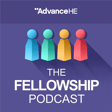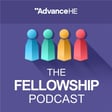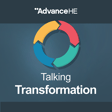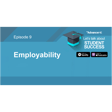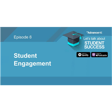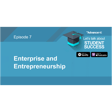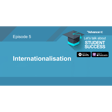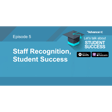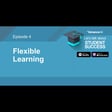Become a Creator today!Start creating today - Share your story with the world!
Start for free
00:00:00
00:00:01

Applying for Principal Fellowship
This month Louise, Marita and Raj are joined by special guest and Principal Fellow Gemma Witton from the University of Wolverhampton to discuss the differences between Principal Fellowship and the other categories, how to go about producing a successful PF application from start to finish and the resources and guides available at Advance HE to help you put together your application.
Transcript
Introduction and Welcome
00:00:13
Speaker
Oh, hello everyone and welcome to episode four of our Fellowship podcast series. um It's hello from me, Louise Lumsden, Head of Fellowships Teaching, and I'm delighted to be joined again by Raj.
00:00:26
Speaker
Hi everyone, on this is Raj Deema, Fellowship and Board's Advisor Advanced HE. And Marita. Hello, I'm Marita Grimwood, Senior Advisor for Teaching Fellowships at Advanced HE.
00:00:37
Speaker
And I'm also delighted to say that for this very special episode, we have a special guest. And I'd like to introduce Gemma Witton, Associate Professor of Academic Development.
00:00:49
Speaker
Gemma is a Principal Fellow, the Scheme Lead for QDOS at the University of Wolverhampton and the Co-Lead of the profession Principal Fellow West Midlands Network. So very warm welcome, Gemma.
Recap of Previous Episode
00:01:02
Speaker
Hello. Thanks you thanks so much for having me. It's nice to be here.
00:01:05
Speaker
um Thank you So just as part of a recap, in our last episode, we focused on the very simple reflective model that we have in our Advanced HE Applicant Guidance for all categories of fellowships.
00:01:21
Speaker
Our focus was to talk through the reflective model to support how evidence can be presented in an application for any of the four categories of fellowship. We have noticed the many comments that we're receiving about our fellowship podcast. We're absolutely delighted.
00:01:38
Speaker
And thank you so much for tuning in to listen. um We really do appreciate and we hope that this is supporting anyone who is thinking of applying for a category of fellowship.
00:01:49
Speaker
It's helping all those who are supporting others to apply for a category of fellowship and hope, whichever the case, you're all gaining um a top tip or two to support you through the journey.
Engagement and Hashtag Promotion
00:02:04
Speaker
As a reminder, you can get involved with our Fellowship Podcast series via the hashtag AHEFellowshipPodcast.
Exploring Principal Fellowship
00:02:13
Speaker
So for this episode, which is a featuring principal fellowship that's descriptor four of the Professional Standards Framework,
00:02:21
Speaker
I'm going to hand over to Marita. And Marita, as many of you will know, leads on all things Principal Fellowship. So Marita, over to you. And thanks so much, Gemma, for joining us today for what promises a really insightful and useful episode.
00:02:39
Speaker
And one that i I personally know is eagerly awaited and will be extremely valuable. So thank you very much. And over to you, Marita. Thank you so much, Louise.
00:02:51
Speaker
And um yeah, really excited to have you with us again, Gemma here. And I think we invited you for two reasons, really, um or for two main reasons, apart from the fact that we know you and we like obviously.
00:03:04
Speaker
um but ah But there are two things. So you're very involved in um in work at Wolverhampton University and there's a pathway there for an accredited pathway there for principal fellows and you do some interesting work as part of a team supporting that so that's interesting and also um and and also you have recently become involved in leading a regional network principal fellows so it just seemed to connect we were thinking about the wider impact of principal fellow beyond the individual so the you know within the institution how it worked in an institution and and beyond that so you seemed like a great person to um to bring on board so thank you Gemma well thank you um now I did promise last time and I think it's useful before we get going
00:03:55
Speaker
to think about what principal fellowship actually is, um because if we're exploring its impact, we need to think about what it is that we're that we're talking about.
Key Components of Principal Fellowship
00:04:06
Speaker
And I gave a little teaser in the last podcast saying that we would talk about the right practice, the right impact and the right moment as the key ingredients for a principal fellow application.
00:04:19
Speaker
Now, this is my way of describing it and I welcome the rest of the team and Gemma, if you have any other ah thoughts on this. um But needs the right practice.
00:04:31
Speaker
So to be a principal fellow, you need to have your strategic leadership practice with extensive impact on learning and teaching. You need to show the right evidence of impact. So it's not enough to show, to say that you've been an effective strategic leader.
00:04:46
Speaker
You have to show it. You have to show how you know it's worked, how you would evaluate that. and how it's achieved its strategic goals, how you know that those goals have been met, and then the right moment.
00:04:59
Speaker
So an application has to show sustained impact over five to seven years, um and it needs to be current. So you need to make sure you're at a point where you've got that impact.
00:05:12
Speaker
It's not gone out of date, or enough of it has not gone out of date for you to be able to write your three or four case studies. um and um and you're you know you're at a point where you've gathered the evidence of impact and you're ready to go.
00:05:27
Speaker
so I think those are three really useful questions to ask when you're beginning to apply. But Gemma, I wonder if there's anything that you say to applicants that you would highlight here?
Fishing Analogy for Strategic Roles
00:05:42
Speaker
Oh, yeah, absolutely. I think the right moment is a key one, actually. and You um talked about the right moment, and I think the right moment to start thinking about principal fellowship is a little bit before you're ready to apply and using the professional standards framework to really um guide the areas that you need to develop and and start to be strategic, not just about the work that you're doing, but also about the experience that you're gaining as well.
00:06:07
Speaker
i'm I like to explain principal fellow um and what that is to people in and using that old adage about if you teach a man to fish, you can feed him for life. And And that difference between senior fellows and principal fellows is the senior fellows are going out there, they're teaching loads of other people to fish.
00:06:26
Speaker
And it's a really wonderful thing. But the principal fellows, they're the ones who recognise that fishing was going to benefit the community in the first place. they They understand the most effective ways to catch the fish, the most fish, the difficult to reap fish.
00:06:39
Speaker
um and They might have invented a new net or, you know, exploring new areas to to to fish in. i That's how I try to explain the difference between senior and principal fellow when I'm i'm talking to people.
00:06:55
Speaker
That's really useful, Gemma. Louise and Raj, do you have any thoughts about that? Yeah, i think that's really interesting. and Analogies are a wonderful way and of trying to make sense of something that might initially feel alien. And I think it's important to contextualise this and in terms of where it came about. And this category is a a really core category in the framework which hasn't been around for that long in terms of the history of the PSF it came into play in 2011 and run for the duration of that framework and was revised and enhanced quite significantly as you Marita might touch on but in the changes that have been made particularly um thinking about this category the the framework is really about designing the key aspects of
00:07:38
Speaker
the role and responsibilities of what higher education is doing and particularly the key people within that who are kind of driving that change in that vision and d4 and pf was designed to do that and it's just wonderful to see how gem is encapsulating that and how institutions and individuals are working with it running with it and and celebrating it to do some really great stuff about things that we may not necessarily know about now, but need to plan for and and deal with in the future. And now more than ever, in terms of the criticality of what's going on in our education across the globe, the challenges in sustainability, financial, et cetera, et cetera, those key visionaries or the kind of adage that Gemma outlined in terms of the new nets need to be created and who's going to create those? That's our principal
Gemma's Journey to Principal Fellowship
00:08:21
Speaker
fellows. And it's great that, you know, we've got those analogies to kick off with. So a really key aspect of PSF and a vital category that's great to be talking about here.
00:08:31
Speaker
I was just going to say I can feel that you spoke about ingredients. Gemma spoke about fish. I was thinking what other analogies might come across um throughout this episode. You know, where are we going with this? You know, which which did I did find quite quite amusing.
00:08:48
Speaker
But I just also wanted to say that I think. and If you put principal fellow in the context of all of our fellows, you know, we've just celebrated 2,000 principal fellows and we've also celebrated 200,000 fellows across the four categories.
00:09:05
Speaker
So I think it's just that proportion of colleagues who have the right practices, you were saying. And, you know, it's also thinking about the future. And I'm sure you're going to come on to this about the right practice and, you know, making those and decisions and seeking out those opportunities to gather that evidence because practice can be drawn on, as you said, Rita, between the last five to seven years.
00:09:32
Speaker
Yeah, that's that's absolutely right. ah I hadn't noticed the metaphors, Louise, but maybe we'll end up with a fish pie or something at the end of this episode. Let's ah let's see see how we go.
00:09:44
Speaker
um yeah that's set that's a really good, but there is so there are relatively few principal fellows, aren't there? And I think some people think this is because it's somehow very, very difficult compared to the other categories, but it's actually much more, as you say, about but having the right experience and not everybody...
00:10:02
Speaker
has the opportunity or wants to develop that strategic leadership practice. And there are there are fewer people doing that than um and the kind of practice that we we see in the other in the other categories. But I would love to come back to you, Gemma, at this point, for you to say something about It's value, the value of principal fellowship from ah kind of individual perspective. So from your own perspective, because you are very pleased i't to get your principal fellowship and you've worked with and supported others to get principal fellowship. So I just wondered what you would say about the personal benefits and value of it.
00:10:42
Speaker
So from my personal experience, I think principal fellow was um a key milestone for me. um as As I mentioned earlier on, and advice that I was given was, you know, if you're thinking about principal fellowship, start thinking about it before you're ready to apply. And I did.
00:10:58
Speaker
And I used that framework as a guide to my own development. um And I used the tools, the category fellowship tool to identify what my strengths were.
00:11:10
Speaker
what areas of practice I needed to really develop. um And then ah that's the advice that I give to to other people as well. Just really be strategic in seeking those opportunities out that are going to help you towards getting that recognition.
00:11:23
Speaker
i'm Something that surprised me um about the process of applying was um how important it was to um go out to the people who I've worked with over the years and ask for feedback and seeking feedback for ah whether it would be for my advocate statements or I also got short testimonials as well as supporting evidence from people.
00:11:45
Speaker
And you kind of always hope that people who are on the receiving end of you in projects
Cohort Approach Benefits
00:11:50
Speaker
and at work and feel the same way that you do about the work that you're doing. So, um and and the the leadership that you've provided for different scenarios. So to put yourself out there and say, you know, what did you think about this? Can you give me some feedback? It's quite a scary thing, really daunting thing. i was terrifying, probably the the scariest thing.
00:12:14
Speaker
i am especially if you're asking them to validate that retrospectively. But actually, everybody was very kind. It was really self-affirming.
00:12:25
Speaker
so So that's really interesting. So it's a scary process that you found it. And then it ended up being quite the opposite. So what would you say to people who are thinking, I think I might have the practice, but I don't know about the evidence of impact.
00:12:40
Speaker
And I don't know if it's out there. What advice would you... i'm Certainly try and build in opportunities for evaluation. if you If you're thinking about principal fellowship in the next 12 to 18 months and you're working on things now, really build in opportunities to get that feedback in the moment rather than going out for for that feedback.
00:13:00
Speaker
um And it it does it does really help in terms of things like imposter syndrome and and and your own professional identity to get that feedback. So certainly build that in. i'm What I thought about the application process itself as well, does it helped me to look at my practice through a bit more of a strategic lens and it's really informed how I work going forwards as well. So um i i feel more confident about myself as a strategic leader. i I think about myself in that way now. I've had it externally validated by sending it off to Advance HE and having some people sort of validate that actually, yes, that's the work that I've done.
00:13:38
Speaker
um And it definitely gave me the confidence I needed um and and was definitely instrumental in um applying for promotion, apply applying for conferment as associate professor. i did shortly after. and There was lots of crossover and it was definitely a key factor in ah helping me successfully apply for that i because it sort of changed my mindset. it It helped me to develop that strategic lens and thinking about the way that I approach work.
00:14:06
Speaker
That's but interesting as well. So it sounds as if it was a developmental process for you We've talked about having the right practice, but there's also something in that about recognising that you have the right practice because people a lot of people don't go around thinking of themselves as strategic leaders. it it can feel i think a lot of people feel that's quite an arrogant thing to think about themselves.
00:14:32
Speaker
So like that validation makes sense. Yeah, and that's that's the conversations that i have with a lot of the people who I mentor are around um not thinking about principal fellow as an end point and the goal that, you know, you get there, you've achieved it and that's it. But a lot of the discussions are more about developing that mindset of a principal fellow, choosing the right language to describe what you do and and being comfortable with taking ownership of ah their activities and their contributions within those strategic priorities and those strategic pieces of work.
00:15:06
Speaker
um i a lot of the conversations that i have um are helping to unpick which is the strategic bit what's the principal fellow bit in in what we do i'm i'm going to use another analogy um because the the first one went down quite well um i i say that we're um In higher education, we're often doing everything. We're the chief and we're the cook and we're the bottle washer. We're doing the strategic piece, the strategic thinking, but then we're operationalising that. And sometimes we're even doing things down to the delivery as well. And we're doing all of it. And it's very difficult to um separate that strategic piece from the day-to-day working and the day-to-day goings-on. And I think principal fellow and writing an application for principal fellow definitely helps to unpick that.
00:15:53
Speaker
That's really interesting. Louise, were you going to come in there? Yes, I was. i was um Thank you, Gemma. And I think it's that piece, I've heard it recently quite a lot, actually. It's not thinking about the end point, but it's actually the process.
00:16:07
Speaker
And so I've heard applicants who, you know, once they've gone through the process, That's actually been the really informative um aspect of writing the application because it's looking at all of those achievements. It's really teasing out, as you were saying, what it has been the strategic leadership, because I think it's really important for principal fellow to really focus on those key elements.
00:16:35
Speaker
We often see um applicants who have written about, as you say, um other aspects of their practice, but if they need to get to the real nitty gritty of the strategic elements, don't they?
00:16:50
Speaker
And so, you know, do you have some particular strategies that you use with your, and those that you are mentoring and supporting? and Yeah, in terms of ah strategies, I think it's,
00:17:04
Speaker
it's Encouraging people to um think about what they're going to leave out and really curate the examples that they've got very carefully and using the right examples and talking about the right bits of examples. um i I got my senior fellowship in 2015.
00:17:24
Speaker
um I got my principal fellowship um seven years later. So it was, um there were were examples and there were some crossover, but the way that I talked about those examples and the the elements of that work that I talked about um were were very different.
00:17:40
Speaker
and Moving on to thinking then about... how that fits into an institution. you know In our roles within the fellowships team, we work with institutions who see real benefit in supporting cohort of staff to gain principal fellowship.
00:18:01
Speaker
yeah They'll sometimes come to us for for support um with that.
Writing Successful Applications
00:18:07
Speaker
And I just wondered if um Louise, you had anything anything else to say about
00:18:16
Speaker
about um the cohort approach? Yeah, thinking about that, how being in a group can really help, although it's an individual claim.
00:18:26
Speaker
It is, yeah. So i think what we're finding is that a cohort approach, so having um many, you know, a few people, many people, small groups, you know, action learning sets um of individuals who are you know they've done the fa fellowship category tool as you recommended Gemma and yes principal fellow is the right category of fellowship for them to apply for and then using a cohort approach just building that community having those networking opportunities is one of one of the benefits I think of bringing people together but it's about just we we use a 12-week cohort approach don't we Marita and
00:19:11
Speaker
you know, I think that just then brings the application process to the forefront. It gives that continuity. It's that real focus. And, you know, thinking where those examples, how are you going to write about them?
00:19:25
Speaker
and What are you most proud of? What are the achievements and getting going and having others as part of your, of that process and development, I think is you know we're we're seeing as beneficial.
00:19:37
Speaker
And Raj, you've worked with many applicants um you know over the years. I don't know whether you've got some key things to refer to about that process.
00:19:48
Speaker
I have, and I think i mean a lot of it's to do with identity. It's really to do with how people see themselves now and how they plan for that going forward and the space that they want to move into and then where and how they might align that with the requirements of PF. And that can be part of a career development journey or somebody might be already there in their profession and then they can equally represent ah demonstrate the criteria in that way.
00:20:15
Speaker
But I think when we look at it, I think it's thinking about, you know, you can either look at it from a needs basis or a kind of development basis or combination of those. And it's really the collective power of all of that coming together and seeing yourself as ah as someone that can navigate the requirements and then demonstrate that because, know, the criteria in and of themselves, you know, they're not role based in any shape or form.
00:20:42
Speaker
anyone that can demonstrate the criteria it can make a successful claim. And that's the beauty of that, because then that can mix different people up. It's not only for, for example, a PVC in education in institution, it can be for a senior your principal lecturer that also has strategic leadership responsibilities that can demonstrate that in a sustained way that's effective and inclusive.
00:21:02
Speaker
And that's even more interesting and exciting when you then look at that in a diverse way, regionally, nationally, internationally, in range of contexts. And Gemma's given a wonderful insight about that. And there'll be multiple stories like that. And we share as much as we can about those different journeys that people have and the value of that. And also then giving back.
00:21:24
Speaker
I think I just recently shared a blog of you with you, Marita, didn't I, about someone that achieve their principal fellowship five years or five years ago. And then what they've done since then further empower and develop their organisation's work in teaching and learning. And that's just fantastic to see. It's that not only is it the development within and towards PF and and then achieving that, it's then what happens next. So we had a chat with Gemma in five years time. i'm sure Gemma, you've got an interesting idea about what your new net's going to be in the future and or whatever your new approach is going to I think, you know, coming back to see what that traction and that longitudinal approach
00:21:56
Speaker
value of sustained impact looks like as well is all exciting and part of what PF is all about.
00:22:28
Speaker
Yeah, that's ah that's a really good point. that it It's those stories about what people do what people do next with it, how they've got there um what and what they do next. So I wonder if you've got anything, Gemma, that you would observe about that in terms of what people go on to do within their within their institution, within your institution specifically?
Impact of Principal Fellowship
00:22:47
Speaker
Yeah, absolutely. And and certainly and people who I've mentored have gone on to sort of get promoted, get on headhunted, move on to to to bigger and different roles.
00:22:58
Speaker
um I think what's really useful about the Principal Fellowship is um encouraging people to zoom out um of their operational aspects, really think about that interconnectedness there that their work has with the the bigger institutional priorities, strategic, national, sector-wide things, um and um and and then act upon those in a strategic way. and We, at Wolverhampton, we've been through lots of change, um and i've I've seen people, you know, there's there's been um challenges, um and there's been...
00:23:39
Speaker
um Lots of change, really, you know, ah like a lot of institutions at the moment, there's ah a lot of uncertainty in the sector. ah But with that change also comes opportunities for people. And I'm starting to see people who've engaged with our Kudos scheme previously. Maybe they've got senior fellow.
00:23:57
Speaker
They've gained lots of value from that reflective CPD that they've done and then um gone on to um be able to articulate their leadership, understand their influence and move on higher up roles, different roles. And they're starting to have a really big strategic impact on, um,
00:24:16
Speaker
the future direction of the university as we start to rebuild and we start to grow so I think them in five years as they're building their PFHA experience and and evidence over the next few years I think we definitely have some wonderful stories to tell.
00:24:31
Speaker
So in terms of what the institution gains then from this you've potentially got a pool of people who've really worked on their development as leaders and built their confidence and presumably are then there for the institution to to draw for projects that need to happen and changes that need to be made.
00:24:55
Speaker
Yeah. Yeah, absolutely. Absolutely. On that note, I would like to think
Creating a Principal Fellow Network
00:25:00
Speaker
a bit more, Gemma, about networks and about that engagement and potentially impact beyond institutions.
00:25:11
Speaker
So I just I was lucky enough to be able to attend the first meeting of a revived and refreshed Yorkshire and North East England meeting. net PF network the other week.
00:25:23
Speaker
And it was really interesting and encouraging to see how much energy there is for networks, the idea of a network making those connections.
00:25:35
Speaker
I would be really interested to know more about your motivation for setting up the network in the West Midlands. um what I mean, what to your mind is a Principal Fellow network and what was your motivation?
00:25:52
Speaker
oh Well, I have to give some credit to my ah brilliant colleague, and Professor Jenny Jones at Wolverhampton. and She's co-lead of the network with me. And we noticed that there was a bit of a flurry of interest on the JISC mail list for principal fellows and other groups emerging in other regions and ah not wanting the West Midlands to be left out in any way. We we decided that we we might try and establish a group for those who um either live in the West Midlands or work in the West Midlands.
00:26:23
Speaker
um And our aim really was just to bring like-minded people together with an interest in teaching and learning um so that we could network, so that we could collaborate, share best practice um ah and ultimately, i hopefully, influence higher education policy across ah institutions as ah as a bit of a collective. um And we we had a ah really good first meeting before Christmas.
00:26:51
Speaker
um was more of an informal chat um around some different key themes from our institutions. And and what we found was loads of commonality between the ah challenges or our priorities for the current and forthcoming years. And um what we did was pick three of the the top ones. And we're using those as a focus for our meetings throughout the year. and ah we're We're just really hoping to um ah support one another, share good practice, share change.
00:27:23
Speaker
That sounds really creative and and exciting. um who Who have you found engaging with the networks? All sorts of people, a real mixed bag, actually. We've got um colleagues in your typical HE roles. We've got some PVCs and deans and associate deans that you would expect.
00:27:43
Speaker
and We've got professors, associate professors, readers. We've got some of those third space professionals as well that are just having a wonderful strategic impact. um And we've got colleagues from private universities as well, educational consultants. So it makes for some really rich and diverse discussions. um There's lots to learn from one another. i And ah we're also bringing in voices from outside the principal fellow amp club.
00:28:13
Speaker
ah So ah we are looking at ways that we can support others to um aspire to and become principal fellows. And one of the ways that we're doing that is by i am nominating individuals from our institutions who are working on those key themes ah to come and speak and present. And it's it's a really nice way of ah those people who are starting to emerge as strategic leaders to present their work, demonstrate a bit of a bigger sphere of influence and disseminate the great work that they're doing.
00:28:45
Speaker
um We had a couple of people come to our recent meeting, which was around international students. ah We accidentally found out about collaborations that were happening between different people on the call. There's some really nice relationships developing actually that ah maybe wouldn't have happened if we hadn't have all been in the room together.
00:29:06
Speaker
Yes, I mean, that's what we on the fellowship team are really always really delighted to see when um when we see people engaging in their new fellow identities out out in the world, if you like.
00:29:23
Speaker
I mean, Raj, you've been in this team for a long time. is that so I think we've had networks before, haven't we? Yeah. We have indeed, and it's quite an exciting time to think about a what the future might look like. So I think this is a space for, you know, if you're thinking about PF networks if if you're thinking about developing institutional communities, for example, and using principal fellows as a way to really enhance change collectively, that's something that we'd love to kind of hear more about and to get in touch with us about.
00:29:53
Speaker
But these networks are really a kind of powerful way to drive change that that emerges from the institutional need. And Gemma, you know you alluded to you know a huge amount of challenges that are happening not only at your own institution, but across multiple institutions. And that's a collective need that I think principal fellows and ah have an absolutely key role to play. And kind of between us, or between the community of principal fellows, that's something that we can do.
00:30:17
Speaker
um some really great work around and that's something i think that our ambitions for particularly in the space of the quality of teaching them that and learning with uh institutions the advent of ai sustainability sd etc spm education for sustainable development and what that looks like mps have a really vital way in which they've already used approaches to strategic leadership that they know work either in an institutional context or in a subject-based context or discipline context.
00:30:45
Speaker
So let's harness that collective power together do even more good for for what the sector needs. And, you know, Advance HE can, our team can be part of that development with our principal fellows, definitely.
00:30:57
Speaker
Gemma, you talked about the and sort of the unintended outcomes of the, you know, the the network. And I think those are the things that sort of become the glue, don't they? Those,
00:31:09
Speaker
you know that really helped to drive and those initiatives forward and i thought it was really nice to hear um how you're welcoming aspiring and principal fellows as well and that developmental approach to supporting them and to help them to harness those opportunities so I thought that was a really you know interesting aspect to the rejuvenation if you like of the PF network so long may they continue and yes totally endorse what Raj says you know and please do get in touch with us and tell us about your own networks as well. It would be really interesting to hear about them.
00:31:50
Speaker
ah At Wolverhampton, we have an aspiring to principal fellowship group. So supporting aspiring principal fellows is something that's quite close to my my heart. And it that group incorporates our existing principal fellows,
00:32:04
Speaker
ah people who are already working at that strategic level but also a very inclusive and developmental community for people who um see principal fellow as something that they're aspiring to in the future um and you know our existing principal fellows come along they'll talk about their experiences of applying they'll share their top tips um with people who applied once weren't successful talk about how they um approach their feedback, all of those sorts of useful lessons that people learn going through the process that we can share.
00:32:35
Speaker
and And we meet a couple of times a year and ah we do talk about operational versus strategic leadership. We talk about um how to write a good context and leadership statement, all of those sorts of useful things. But um it does also then bring people together.
00:32:50
Speaker
um And we always make time for those members of that group to go off into breakout rooms and and discuss things. So you'll have somebody who's maybe quite senior with someone who is really emerging in that space. And and it just helps them to network and and build those connections and relationships that might help them get the experience that they need to be successful.
Value of Varied Roles in Networks
00:33:13
Speaker
Absolutely. and And you think how many spaces are there where you can just meet with other people from all of those different kinds of roles and locations? They might not even be based in institutions, oh but they you know they could be coming from, ah you know as you say, independent independent consultancy or a number of other kinds of places.
00:33:35
Speaker
roles so it's really it's it's really valuable I think um and speaking of that variety of roles I hope I'm not pre-empting you Louise because I know i know you want to round off um this uh this podcast quite shortly but I think it seems appropriate to mention again as our festival of fellowship where we have a number of uh resources on our festival of fellowship web page there are examples of and people's, you know, yeah there are individuals who've applied for Principal Fellow and there are also people using the Festival of Fellowship hashtag, I know, on but LinkedIn and it can be a really helpful place to start to get a sense of what other people are doing and the range of people who might have a particular category of fellowship.
00:34:26
Speaker
I think that was brilliant. Well said, you know, we have a range of resources on our website. We have the very helpful video that you um have recently undertaken in your conversation um to support our 2000th Principal Fellow.
00:34:40
Speaker
And we've also, as you say, we've got the Festival of Fellowship. We've got lots of blogs where um individuals who've been awarded Principal Fellow are talking about their um specific evidence and that it could be about the process, it could be about how they gathered evidence, um you know, a whole myriad of things.
00:34:58
Speaker
But we've also got our aspiring Principal Fellow network on Advance HE Connect. um So I think we've had such an interesting experience episode haven't we Raj Marita and thank you so much Gemma um for sharing your invaluable insights and I don't think have you got any final thoughts Marita
00:35:23
Speaker
um Well, I'm thinking, well, we had, ah well, I could go back to the metaphors and we went we went on to Domino's midway, which didn't fit with the food theme. Although Jim did introduce cheap cook and bottle washer. So in higher education, we get our own ingredients, we make something with them and then we clear up afterwards. That would seem...
00:35:44
Speaker
That would seem to be fair. But I think um but it's been it's been great talking to you, Gemma. And I think we should have more guests on our podcast in the future as well. ah oh Absolutely. And Raj, do you have any takeaways that you'd like, any final points? Just I think we're at a really interesting juncture, really, in this space. And even though this particular category has been ah around for quite some time, and as we touched on earlier, there's only 1% of Principal Fellows and and not everyone will necessarily aspire to be Principal Fellows in their whole career, in their whole lifetime, in whatever higher education tertiary context. the
00:36:21
Speaker
For those that do, alongside the other categories of fellowship combined, you know the 200 000 plus um those principal bells combined with the efforts of every other fellow and everyone that wants to do good in teaching and learning it's a real you know kind of catalyst for change a power of force and just exciting to kind of see what the next few years bring in this space as we evolve the psf and embeds further in different contexts and new contexts and it it just brings out the the best of what institutions want to do and what individuals want to do in this particular space and teaching learning now more than ever is just so important for all institutions to work on and I think you know fellowship absolutely has a key key ah her role in taking that forward so yeah look forward to to pick up the serious point in the metaphors as well which I think Gemma referred to earlier it is really about
00:37:13
Speaker
when you're making an application at any category, it's about pulling out which bits of what you do are right for your application, what's what's going to be relevant. And I think that's probably particularly true for principal fellowship.
00:37:28
Speaker
Yeah, and exactly, Marita. Those strategic leadership, the key ingredients and those appropriate activities, definitely. for As always, I just want to end with what's coming next.
00:37:42
Speaker
So our next episode, um we are going to be looking at another category of fellowship, which is Descriptor 2 that aligns to Advanced HE Recognition as Fellow.
Next Episode Preview: Advanced HE Recognition
00:37:54
Speaker
So bleat please do tune in if you're thinking of making an application for Fellow or you are in the middle of writing your application or indeed supporting colleagues. um to apply for Fellow.
00:38:07
Speaker
This is by far the category um that we see the most applications um either coming direct to Advanced HE or through being awarded through institutional accredited schemes and programmes.
00:38:21
Speaker
And so I think it looks to be a busy episode. and Please don't forget also to get involved with our year-long Festival of Fellowship um via the hashtag Festival of Fellowship.
00:38:33
Speaker
And as always, Thank you for listening. Thank you to um Gemma. Thank you It's been lovely to reflect and and a joy to talk to you. Oh, thank you for joining us. And thank you, Marita. Thank you. and Thank you to Gemma as well.
00:38:49
Speaker
And thank you, Raj. Thanks, everyone. And we'll will see you next time. Yes, look forward to seeing you next time. Thank you. Bye.
